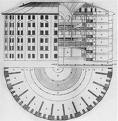A clearer idea of how the NSA orchestrates the Orwellian-Panopticon complex
Nochmal Pepe Escobar: The NSA does the 1980s
In the spring of 1986, Back to the Future, the Michael J Fox blockbuster featuring a time-traveling DeLorean car, was less than a year old. The Apple Macintosh, launched via a single, iconic ad directed by Ridley Blade Runner Scott, was less than two years old. Ronald Reagan, immortalized by Gore Vidal as "the acting president", was hailing the mujahideen in Afghanistan as "freedom fighters".
The world was mired in Cyber Cold War mode; the talk was all about electronic counter-measures, with American C3s (command, control, communications) programmed to destroy Soviet C3s, and both the US and the USSR under MAD (mutually assured destruction) nuclear policies being able to destroy the earth 100 times over. Edward Snowden was not yet a three-year-old.
It was in this context that I set out to do a special report for a now defunct magazine about Artificial Intelligence (AI), roving from the Computer Museum in Boston to Apple in Cupertino and Pixar in San Rafael, and then to the campuses of Stanford, Berkeley and the MIT. ...
Eine Recherche zur Geschichte der künstlichen Intelligenz - als Grundlagenforschung zu dem, was die NSA heute kann - feat. Stanford's John McCarthy and MIT professor Marvin Minskiy, Joseph Weizenbaum, Edward Feigenbaum, Robert Wilensky and the "Chomsky paradigm", die so endet:
Although, predictably, prevented from visiting the NSA, I soon learned that the Pentagon was expecting to possess "intelligent" computing systems by the 1990s; Hollywood, after all, already had unleashed the Terminator series. It was up to Professor Wilensky, in Berkeley, to sound the alarm bells:
" Human beings don't have the appropriate engineering for the society they developed. Over a million years of evolution, the instinct of getting together in small communities, belligerent and compact, turned out to be correct. But then, in the 20th century, Man ceased to adapt. Technology overtook evolution. The brain of an ancestral creature, like a rat, which sees provocation in the face of every stranger, is the brain that now controls the earth's destiny."
 It's as if Wilensky was describing the NSA as it would be 28 years later. Some questions still remain unanswered; for instance, if our race does not fit anymore the society it built, who'd guarantee that its machines are properly engineered? Who'd guarantee that intelligent machines act in our interest?
It's as if Wilensky was describing the NSA as it would be 28 years later. Some questions still remain unanswered; for instance, if our race does not fit anymore the society it built, who'd guarantee that its machines are properly engineered? Who'd guarantee that intelligent machines act in our interest?
What was already clear by then was that "intelligent" computers would not end a global arms race. And it would be a long time, up to the Snowden revelations in 2013, for most of the planet to have a clearer idea of how the NSA orchestrates the Orwellian-Panopticon complex ...
Lesen!
In the spring of 1986, Back to the Future, the Michael J Fox blockbuster featuring a time-traveling DeLorean car, was less than a year old. The Apple Macintosh, launched via a single, iconic ad directed by Ridley Blade Runner Scott, was less than two years old. Ronald Reagan, immortalized by Gore Vidal as "the acting president", was hailing the mujahideen in Afghanistan as "freedom fighters".
The world was mired in Cyber Cold War mode; the talk was all about electronic counter-measures, with American C3s (command, control, communications) programmed to destroy Soviet C3s, and both the US and the USSR under MAD (mutually assured destruction) nuclear policies being able to destroy the earth 100 times over. Edward Snowden was not yet a three-year-old.
It was in this context that I set out to do a special report for a now defunct magazine about Artificial Intelligence (AI), roving from the Computer Museum in Boston to Apple in Cupertino and Pixar in San Rafael, and then to the campuses of Stanford, Berkeley and the MIT. ...
Eine Recherche zur Geschichte der künstlichen Intelligenz - als Grundlagenforschung zu dem, was die NSA heute kann - feat. Stanford's John McCarthy and MIT professor Marvin Minskiy, Joseph Weizenbaum, Edward Feigenbaum, Robert Wilensky and the "Chomsky paradigm", die so endet:
Although, predictably, prevented from visiting the NSA, I soon learned that the Pentagon was expecting to possess "intelligent" computing systems by the 1990s; Hollywood, after all, already had unleashed the Terminator series. It was up to Professor Wilensky, in Berkeley, to sound the alarm bells:
" Human beings don't have the appropriate engineering for the society they developed. Over a million years of evolution, the instinct of getting together in small communities, belligerent and compact, turned out to be correct. But then, in the 20th century, Man ceased to adapt. Technology overtook evolution. The brain of an ancestral creature, like a rat, which sees provocation in the face of every stranger, is the brain that now controls the earth's destiny."
What was already clear by then was that "intelligent" computers would not end a global arms race. And it would be a long time, up to the Snowden revelations in 2013, for most of the planet to have a clearer idea of how the NSA orchestrates the Orwellian-Panopticon complex ...
Lesen!
gebattmer - 2014/02/06 19:00



























































Trackback URL:
https://gebattmer.twoday.net/stories/664972564/modTrackback